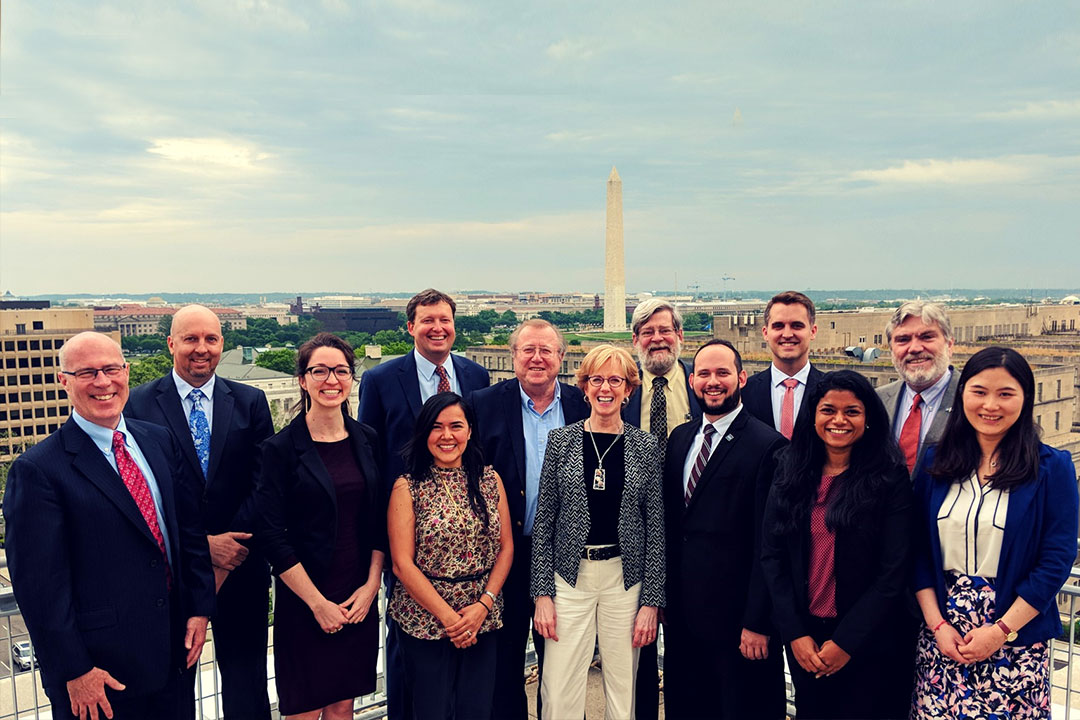The GW Regulatory Studies Center celebrates its 10th anniversary this fall, marking a decade as a leading resource for applied scholarship on regulatory issues and a training ground for understanding the impact of regulation in the public sphere.
Chartered as an academic center in Columbian College’s Trachtenberg School of Public Policy and Public Administration (TSPPPA) in 2009, the center's research, education and outreach mission focuses on promoting best practices for regulatory analysis, improving regulatory institutions and serving as a source for objective information on regulatory matters. From its beginnings with one full-time faculty member and a part-time graduate assistant, the center has grown to a robust staff of full-time researchers—including four faculty members—plus a network of affiliated faculty and an operational support team that delivers events and other programming throughout the year.
"I’ve been proud to call George Washington University home for 10 years,” said Founding Director Susan Dudley. “With its D.C. location, well-respected faculty and intelligent, motivated students, it is the ideal forum for the Regulatory Studies Center’s rigorous research and academic mission.”
Co-directed by Dudley and Trachtenberg Professors Chris Carrigan and Joe Cordes, the center collaborates with faculty and students from departments across the university. Since its inception, center scholars have frequently testified on Capitol Hill and served as a resource for media on regulatory issues. Their expert articles regularly appear in both peer-reviewed academic journals, such as the Journal of Policy Analysis and Management, the Public Administration Review and Risk Analysis, as well as major media outlets like The Wall Street Journal, The Hill and Forbes magazine.
“The GW Regulatory Studies Center is a pivotal force for new analysis, important programming and overall promotion of public awareness of regulatory issues,” said Professor Cary Coglianese, director of the Penn Program on Regulation. “We all benefit from the work they do.”
In an upcoming video commemorating their anniversary, Harvard Law Professor Cass Sunstein, who served as President Obama’s “regulatory czar,” described the center and its staff of academics and experts as a “national treasure.”
The center has become renowned for its weekly Regulation Digest, as well as its popular events, from forums on regulatory policy and practice to presentations from authors, newsmakers and scholars from legal, policy, political science and economic fields. It has hosted high-ranking officials from each of the last six administrations, international diplomats and members of Congress from both major parties and independents. Former U.S. Senator Heidi Heitkamp (D, N.D.) has praised the center for helping the Senate “develop bipartisan, commonsense approaches to improve how federal agencies develop and consider regulations,” while Senator Mike Enzi (R, Wyo.) has called the center “a wonderful resource. Its timely and focused research crafted by leading experts has been indispensable.”
Within TSPPPA, the center continues to support students through research opportunities, career guidance and stipends that free them to accept prestigious unpaid internships in government agencies. Thanks to its Regulatory Studies Fellowship, for example, public administration graduate student John Bertino is currently interning at the Office of Information and Regulatory Affairs, analyzing and providing comments on proposed regulations by federal agencies. “For someone who is interested in federal service, this is an extraordinary place to gain experience,” he said. Other students have gone on to influential public policy and public administration positions in, among other fields, executive branch agencies, congressional offices, think tanks and trade associations.
“Through the Regulatory Studies Center, our students and faculty have unique opportunities to conduct informative research and learn about regulatory tools and options,” said TSPPPA Director Mary Tschirhart.
The center will formally celebrate its anniversary with a public event in early 2020, with updates and events listed on its website, Twitter and Facebook.


